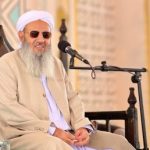 In a bid to lure Taliban into a peaceful reconciliation in Afghanistan, the UN Security Council removed 14 former Taliban members from its sanctions list.
In a bid to lure Taliban into a peaceful reconciliation in Afghanistan, the UN Security Council removed 14 former Taliban members from its sanctions list.
The decision by the special sanctions committee to remove the 14 Taliban leaders from its international blacklist “sends a strong signal,” Germany’s UN ambassador Peter Wittig said Friday, July 15, in a statement, cited by Reuters.
“The Security Council and the international community support the efforts of the Afghan government to engage reconciled Taliban in a political dialogue in order to achieve peace and security,” Wittig, whose country holds the Security Council presidency this month, said.
The delisted included four members of a 70-strong High Peace Council set up by Afghan authorities last September to pave the way for talks between the group and Kabul on a peace deal.
The move came in response to a request from Kabul to take off the list a number of former Taliban figures that the government believes have given up militancy, according to the statement.
Afghan officials had said they were seeking the delisting of about 20 people. Some Security Council members, notably Russia, are cautious about removing names.
The sanctions were imposed in 1999, when the Taliban were in power in Afghanistan, and were expanded after the 9/11 attacks on the US.
The peace council members are Arsalan Rahmani Daulat, a former Taliban deputy higher education minister, Habibullah Fawzi, a former Taliban diplomat in Saudi Arabia, Sayeedur Rahman Haqani, former Taliban deputy minister for mines and industries and later for public works, and Faqir Mohammad.
President Hamid Karzai’s office has called the creation of the council a significant step toward peace. But the Taliban have so far scoffed at the idea of talks, saying all foreign forces must first leave Afghanistan.
The United States is preparing to start pulling out its 97,000 troops in Afghanistan as part of a process to hand over all combat operations against the Taliban to Afghan security forces by 2014.
Clear Message
The Security Council said the move sends out a clear message of support for the peacemaking efforts in the war-torn country.
“The message is clear: engaging for peace pays off,” Wittig said in the statement.
“The international community recognizes efforts made by members of the High Peace Council to work toward peace, stability and reconciliation. All Afghans are encouraged to join these efforts.”
The move came four weeks after the Security Council decided to split what was previously a joint list of Taliban and Al-Qaeda figures into two — one for each group.
The split was intended to persuade Taliban waverers they were not being lumped with the global Al-Qaeda movement.
Until Friday’s decision, the Taliban list contained 137 names. Those listed are subject to sanctions that include travel bans and asset freezes.
Former Defense Secretary Robert Gates said last month there could be political talks with the Taliban by the end of this year, if the NATO alliance kept making military advances on the ground, putting pressure on the insurgents.
Afghan President Hamid Karzai also revealed that the United States and other foreign powers are engaged in preliminary negotiations with the group.
The Taliban, which ruled Afghanistan in the 1990s, were ousted by the United States, which invaded Afghanistan shortly after the 9/11 attacks in 2001.
Since then, Taliban fighters have engaged in protracted guerrilla warfare against the US-led foreign troops and the West-backed Hamid Karzai government.
In the past two years, violence became at its worst across Afghanistan, with civilian and military casualties at record levels despite the presence of 150,000 foreign troops.
Source: OnIslam & News Agencies










Comments